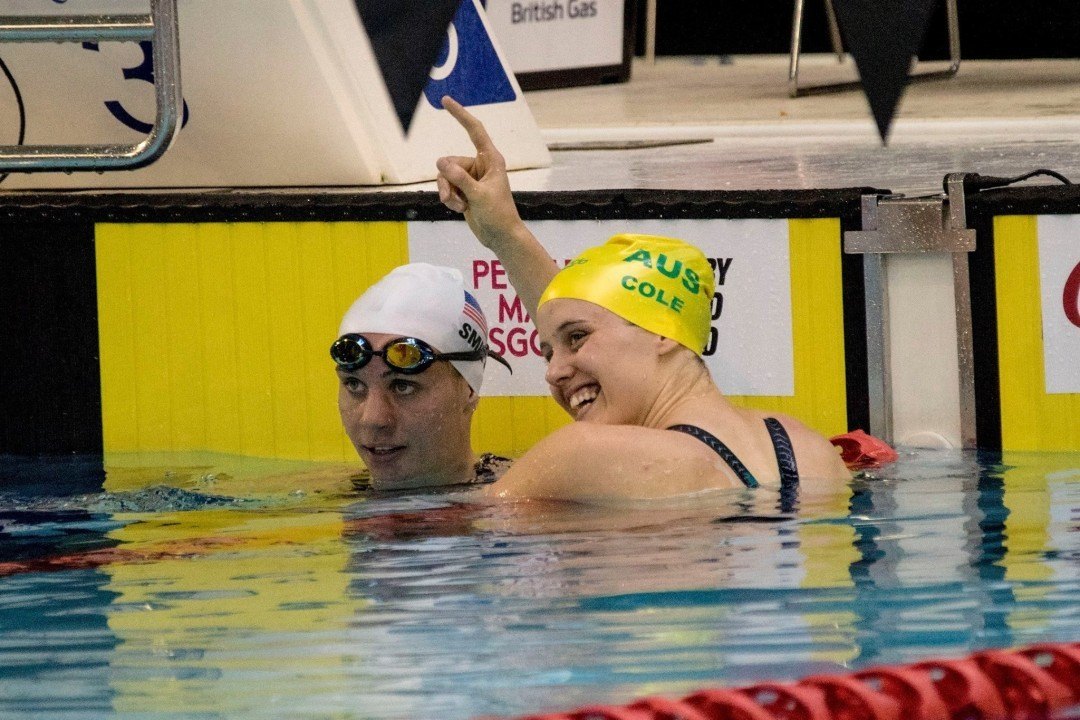2019 WORLD PARA SWIMMING WORLD CHAMPIONSHIPS
- September 9-15, 2019
- London Aquatics Centre, London, England
- Prelims 10 a.m. local time/finals 6 p.m.
- Full results
Courtesy: Nate Williams
Australian Paralympic swimmer Ellie Cole says training alongside her country’s Olympic team will help her close the gap on New Zealand’s S9 leader Sophie Pascoe, who Cole believes can set a new standard in the category since moving down into the classification.
Pascoe, who won nine Paralympic gold medals from three Games in the S10 class, was moved down to S9 earlier this year following controversial changes to the classification system, which the IPC began implementing in 2018.
The 27-year-old Cole expected the change to happen, however, so isn’t deterred Pascoe’s introduction to the class, and hopes it will push herself and other swimmers in the category further.
“Obviously I’ve seen what she’s done in the S10 category and she made her mark there,” Cole, who has six Paralympic and three world titles, said. “But a part of me always knew she might end up in my category one day.”
Cole has made one key change she hopes will bring her closer to a personal best time before the Tokyo Paralympics next year: moving to Sydney to be under the guidance of Simon Cusack. Cusack trains Olympic and world champion freestylers Cate and Bronte Campbell, compatriots Cole describes as “dedicate” and the “best 100m freestylers in the world.”
Cole adds that coach Cusack was somewhat cautious about taking on a commitment to Cole due to a double schedule of major events.
“Simon has never coached a para-swimmer before at an elite level,” Cole said. “When I approached him to try and ask if I could join his programme, he was a bit hesitant. He said if I wanted to be coached by him, he wouldn’t be able to go to the Paralympics as well. Because he’s already going to the Olympics with Cate and Bronte.”
Cole’s competition, the 26-year-old Pascoe, had her left leg amputated after a lawnmower accident as a child, but this also caused nerve damage on her right-hand side. That nerve damage puts Pascoe rightly in the S9 class in Cole’s book.
“Usually with S10’s they are a below-knee amputee, but Sophie is affected on her other side,” Cole continued. “When she was originally classified, I knew they didn’t consider that. When she did get put into my classification I wasn’t surprised at all.”
She added: “If anything, it’s going to raise the bar for S9’s, just like [South African 13-time Paralympic champion] Natalie Du Toit did back in the 2000’s.”
Cole and Pascoe have known each other since they first started competing internationally at the 2006 World Championships in Durban. But they had never raced head-to-head before meeting on the blocks at this year’s World Para-Swimming Championships in London.
In the early days of the meet, Pascoe won three golds: in the 100m freestyle, 100m butterfly and 100m backstroke, with Cole grasping silver in the latter, three seconds behind Pascoe’s championship record time of 1:07.49
Pascoe’s strength doesn’t have a mental effect on Cole, but she says the case may be different for others.
“I’ve known Sophie 15 years and I’ve never raced her before this week at this competition,” Cole said. “I have a lot of media ask me about it as a rivalry, and for me it’s not. It doesn’t matter if Sophie’s in the lane next to me, because all I care about is my PB times and if anything, Sophie being in that race is going to push me.”
“For some people it will [have a mental effect] because they are fueled by rivalries. I’m the opposite, I’m internally fueled by my own goals and that is right now to swim a personal best before I retire.”
After Tuesday’s second gold medal, Pascoe said the other women in the S9 category have made her “feel welcome.”
“I haven’t been classified since I was 11 years of age,” Pascoe said. “The girls have been accepting of me as an S9 and that change hasn’t really affected me in how I challenge myself.”
Meanwhile, in training for Worlds and to race Pascoe, Cole says she did not receive any special treatment; she had to do her best to keep up with the Campbell sisters.
“When I joined his programme there wasn’t any adaptation. The rule was, ‘you have to keep up,’” she said, with a laugh. “Training has been tough but when you’re chasing to of the best 100m freestylers in the world, you’re going to see some results in terms of being faster. I’m not that far off my personal best times, just 0.6 seconds and this week in London has been good for a sense of direction.”
“I’m probably one of the first Paralympians in Australia to join an Olympic programme,” Cole added. “It’s great to be part of a programme where 100% of the people there are aiming for a gold medal. It’s unlike any other programme in the world.”
The 2019 World Para-Swimming Championships run until Sunday, 15 September, and Cole will be chasing another medal in the S9 400m freestyle on Friday.

I haven’t been much of a para swimming fan due to the on going classification controversies but I do like Ellie cole as an athlete
What a fantastic athlete with a great attitude . Thanks to Ellie for being an inspiration to our kids .
Brilliantly stated and so very true SAMESAME.
Anyone who has read Sophie Pascoe’s book, a stroke of fate, would know all about her classification histories. The real story is how does Ellie Cole feel about racing fellow Australian Lakeisha Patterson when there is so much evidence backing up the allegations that she fakes her claimed disabilities Left Hemiplegic Cerebral Palsy and Early Onset Parkinsons Disease? I’d like to hear what she has to say about that after she crucifies her in the S9 400 free.